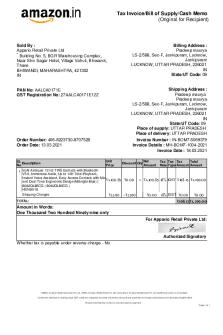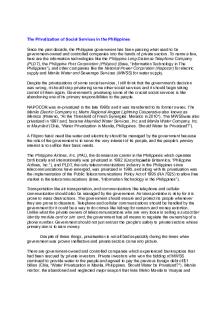The self in the social world PDF

| Title | The self in the social world |
|---|---|
| Author | Sciatta Stevquoah |
| Course | Theories Of Behavior |
| Institution | University of Phoenix |
| Pages | 6 |
| File Size | 99.2 KB |
| File Type | |
| Total Downloads | 94 |
| Total Views | 153 |
Summary
Examining yourself in the social world...
Description
1
The Self in the Social World PSY/420 July 22, 2019 Nicolette Nance
2 The Self in the Social World For any person growing up, the idea of figuring out exactly who they are can be a daunting task that can take years to figure out and understand. As times change, people look to see themselves in different forms and develop their identities based on what images and depictions they’re seeing. A woman may feel that she is too fat and doesn’t meet the desirable standard because the images of women in magazines and television tells her that the desirable standard is much thinner. A man may feel that he does not do enough for his family and that he let them down because his father went through much harder problems yet still provided for him. One’s self worth can often be developed based on the people around them and the things that they see. This is in fact the case for my development of a self-identity. Childhood Growing up, I was raised in a single parent home with two older siblings. My mother worked a lot to make sure that we all had comfortable lives, dealing with multiple setbacks such as having multiple failed relationships that left her with three children from different fathers, to having to file for bankruptcy after going into debt to afford my brother’s private school. I believe these setbacks, as well as having a disabled child, is what essentially hardened her and made her into the mother that I grew up with. I love my mother, but she was very verbally abusive, not only to me, but to my siblings as well. She would often put me down, whether it was about my appearance or my smarts, calling me fat, ugly, and dumb at times. Naturally, my mother played a large role in my development but also a large role in my lack of self-esteem and poor identity. Being disabled, I required an aid in school who would assist me throughout the day. This woman was part of my life daily from third grade until I went on to high school, so she was a key figure of my growing up and my development. Unfortunately, while I was being verbally abused
3 at home, I was receiving the same treatment through my aid in school. She was just as verbally abusive if not worse. She would often scream at me in front of other students, mocking my appearance, my weight, and my academics in front of everyone. This was extremely humiliating, and I eventually began to shut down, often too scared to speak up in fear of more abuse. As a disabled person, I already had a troubled self-identity. Research has shown that people with disabilities tend to have a negative self-image, with some believing they deserved to be put down because their disability made them less worthy of respect (Charn, Hersh, Milton, & Su, 2018). I felt the same way, and her abusive behavior made me feel even worse. Because I am a very quiet person and I struggle to speak up, as well as my physical disability, I’ve had many dispositional attributions made about me. People have believed that I simply couldn’t speak because I was always quiet. One message that always stood out to me is when someone said that I was spoiled and thought I was better than everyone else. When I asked why they felt this way, they said it was because I barely ever spoke and wouldn’t look at them for too long. These are traits I developed due to the abuse I faced because I feared how people would react to me speaking up or maybe accidentally looking at them the wrong way. Another message that stood out to me was when I was in school and was very tired, almost falling asleep in class. Seeing this, my aid said that it was because my mom must’ve woken me up too early and was being neglectful of my needs. This was a situational attribution applied to me because she assumed my tiredness was due to my mom or other reasons outside of my control, instead of blaming me and maybe thinking that I was up too late the night before. This also stood out to me because she would blame my mom like this for multiple things, and it was a bit confusing and odd to me because they were both abusive towards me, yet she seemed to believe she was better than my mother.
4 Current Views Because I was abused by people who were supposed to care for me and help me, I am often wary of people in authority now. This is also because since my aid often abused me in front of other authority figures like teachers and they said nothing to stop her, it made me feel like I was essentially on my own and I had to take care of myself. This has continued to today where I struggle to ask for help and am often scared to ask my mom for assistance with things such as going to the bathroom. This is a common thing among adults who were abused as children. Research has shown that adults who were verbally abused as children develop internalizing disorders such as post-traumatic stress disorder, social phobia, and generalized anxiety disorder (Sachs-Ericsson, Verona, Joiner, & Preacher, 2006). I’ll often be nervous around people from an older generation and feel more comfortable with people closer to my age. Growing up in the age of social media, my self identity and image has changed, and I’ve used it to help me come out of my shell and undo the damage of verbal abuse. Social media involves social interaction and communication, so a user’s decision to communicate on social media can depend on their concept of themselves (Pan, Lu, Wang, & Chau, 2017). You must be willing to put yourself out there and also interact with people you don’t really know. This translates to my professional image. I am going to be interacting with different amounts of people and I need to feel comfortable and confident enough to do so. The abuse I’ve faced has still made me soft spoken and nervous to speak up, but social media and the new people in my life has helped me to form a better professional identity. Conclusion In conclusion, growing up in an abusive social world made me very soft spoken and nervous of those in authority. I struggle to speak up and express myself, and because of this,
5 people misunderstand me and believe that I’m stuck up or that I think I’m better than them. Dispositional attributions such as this makes me feel worse and inspires me to try and better myself. Using social media and a need to create a better professional image, I am working on fixing my self image and self-esteem. The abuse that I’ve faced will not define me and I am determined to be more than that, and to become a better and bigger person.
6
References Charn, N., Hersh, D., Milton, K., & Su, R. L. (2018). The Impact of Stuttering on Development of Self-Identity, Relationships, and Quality of Life in Women Who Stutter. American Journal of Speech-Language Pathology, 27(4), 1244–1258. https://doi.org/10.1044/2018_AJSLP-ODC11-17-0201 Pan, Z., Lu, Y., Wang, B., & Chau, P. Y. K. (2017). Who Do You Think You Are? Common and Differential Effects of Social Self-Identity on Social Media Usage. Journal of Management Information Systems, 34(1), 71–101. https://doi.org/10.1080/07421222.2017.1296747 Sachs-Ericsson, N., Verona, E., Joiner, T., & Preacher, K. J. (2006). Parental verbal abuse and the mediating role of self-criticism in adult internalizing disorders. Journal of Affective Disorders , 93(1–3), 71–78. https://doi.org/10.1016/j.jad.2006.02.014...
Similar Free PDFs

The self in the social world
- 6 Pages

The Self in a Social World
- 2 Pages

World in the Balance
- 2 Pages

On the Suffering in the World
- 9 Pages

The Luckiest Man in the World
- 2 Pages

Fishing in the Roman World
- 69 Pages

Mathematics in the Modern World
- 12 Pages

Self Association in Social Media
- 2 Pages
Popular Institutions
- Tinajero National High School - Annex
- Politeknik Caltex Riau
- Yokohama City University
- SGT University
- University of Al-Qadisiyah
- Divine Word College of Vigan
- Techniek College Rotterdam
- Universidade de Santiago
- Universiti Teknologi MARA Cawangan Johor Kampus Pasir Gudang
- Poltekkes Kemenkes Yogyakarta
- Baguio City National High School
- Colegio san marcos
- preparatoria uno
- Centro de Bachillerato Tecnológico Industrial y de Servicios No. 107
- Dalian Maritime University
- Quang Trung Secondary School
- Colegio Tecnológico en Informática
- Corporación Regional de Educación Superior
- Grupo CEDVA
- Dar Al Uloom University
- Centro de Estudios Preuniversitarios de la Universidad Nacional de Ingeniería
- 上智大学
- Aakash International School, Nuna Majara
- San Felipe Neri Catholic School
- Kang Chiao International School - New Taipei City
- Misamis Occidental National High School
- Institución Educativa Escuela Normal Juan Ladrilleros
- Kolehiyo ng Pantukan
- Batanes State College
- Instituto Continental
- Sekolah Menengah Kejuruan Kesehatan Kaltara (Tarakan)
- Colegio de La Inmaculada Concepcion - Cebu







